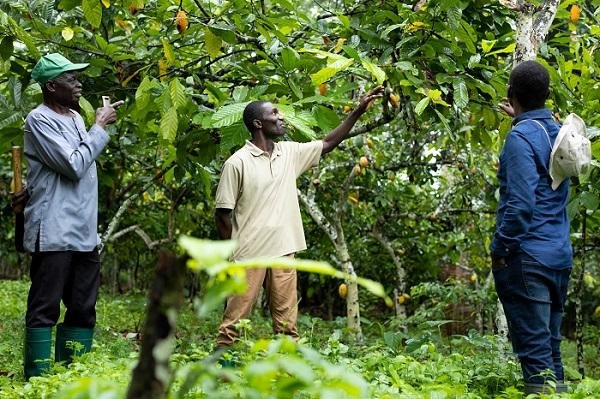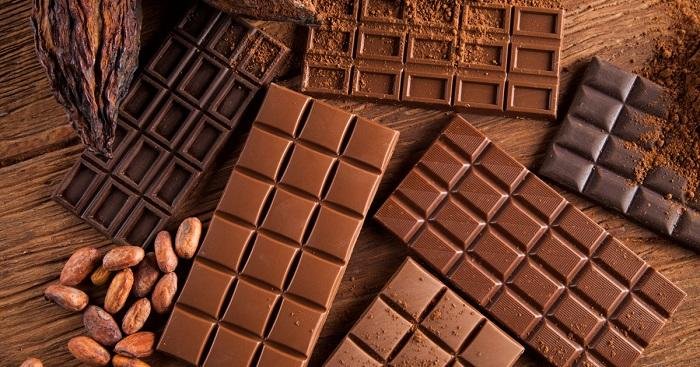Health Essentials
Lamentations of a Cocoa lover – Part 1

Farming have become a preserve of the elderly
Why do we still go globe-trotting calabash in hand, a large entourage in tow and officials back home waiting to pounce on the “booty” that will be squeezed into our calabash like the last drop from an Ideal Milk tin?
We sit on so much wealth but like Diabetes, we are hungry (poor) in the midst of plenty.
I do not have answers to our challenges as a country with my limited information because from where I stand it appears international economic woes alone cannot explain our challenges but we have many smart people in leadership positions so something must be missing.

I am no history scholar (my only claim to that is being a friend to one of the great Prof Albert Adu Boahen’s children. May Chris’ soul rest in perfect peace), I do not think there has ever been a better time in the history of our dear country; stable democracy, peace, loads of knowledge, people willing to make a difference, access to a global market and many more.
Yes, the challenges are humongous, but we are not alone, and the story has always been the same.
For as long as I can remember, we have always been one of the top two producers of Cocoa in the world, yet we hardly have a say in the money we should get from the toils of Tetteh Quarshie.
The cocoa farmer seems to be a “neglected” species. Together with our neighbour to our West, we produce over 60% of the world’s cocoa yet as the price of cocoa products like chocolate continue to rise, the price of our unrefined cocoa beans continues to dance “agbadza” with peaks and troughs; who pulls the strings? My limited economics fails me here.
Fear of the unknown may paralyse us but the obvious should urge us on. The pattern of cocoa growth around the country is changing and climate change is certainly playing a role. Can Cocoa really go extinct (I first heard this on Citi FM) if global warming continues unabated?
Are we losing cocoa only to changing climate, galamsey, disease and aging trees or other issues such as lack of respect for those who till the land including cocoa farmers?
Have we made farming so unattractive that it is now the preserve of the elderly? What happens when that generation moves on to glory? The young ones are moving to the cities to be close to where most of the money from cocoa is spent.
These days I see some beauty products from cocoa, shea butter etc. produced locally. These are amazing world-class products. Why did it take us so long to do so little? These finished products need to be promoted nationwide, then to our neighbours and then around the world. We should use as much as possible here for its health and beauty benefits while creating wealth.
I still think about the National Cathedral, but I will keep my thoughts to myself. We need a COCOA VILLAGE by ALL MEANS. This will be a major tourist attraction for both internal and external clients.
CAN YOU JUST IMAGINE, a world top two cocoa producer has a place where you can go to experience the exciting cocoa story of perseverance, hope and maybe patriotism? A place where you can see a miniature cocoa farm and how it is tendered daily and different stages including harvesting and drying.
Areas that show physically or in pictures processing of chocolate, cocoa bread, cake, pastries, drinks, soap, shampoo, body creams and an endless list. We can throw in a few games/activities and couch them as Tetteh Quarshie’s favourite. Why has this not materialized? Tourism please!!!
At least one day each week should be COCOA DAY; everyone or at least all state offices, functions etc. should serve only cocoa products. We will reap not only from the health benefits but also a product that becomes more attractive world-wide and guess what will follow.
Can we have properly organized “cocoa festivals” at least once a year? It should be fairly easy to set the ball rolling by organizing a mini cocoa festival at least once a month in one COCOBOD facility nationwide; lets showcase cocoa products and add some “flavour” to make it attractive.
ALWAYS LAUGH OFTEN, ENSURE HYGIENE, WALK AND PRAY EVERYDAY AND REMEMBER IT’S A PRICELESS GIFT TO KNOW YOUR NUMBERS (blood sugar, blood pressure, blood cholesterol, BMI)
Dr. Kojo Cobba Essel
Health Essentials Ltd (HE&W Group)
(dressel@healthessentialsgh. com)
*Dr. Essel is a medical doctor with a keen interest in Lifestyle Medicine, He holds an MBA and is an ISSA Specialist in exercise therapy, fitness nutrition and corrective exercise. He is the author of the award-winning book, ‘Unravelling The Essentials of Health & Wealth.’
Thought for the week – “imagine your food as part of your body and let that inform your choices. Do you want to be built of and powered by junk food?”
Reference:
1. Information from National Committee for The Promotion of Cocoa Consumption
2. “Way Maker”
3. “He Made a Way”
4. www.webmd.com
5. www.mayoclinic.com
6. Professor Addai
By Dr. Kojo Cobba Essel
Health Essentials
Your Chair Could ‘Kill’ You! Really?

IF you truly love yourself, you had better read this piece while standing!
The other “inactivity” that rivals sitting for long periods when it comes to poor health and untimely death is LONLINESS! Sitting and Loneliness are the new Smoking.
It is often common to hear a parent tell a child, “Sit quietly and watch television and I will make a quick dash to town.” Well, this harmless and well-meaning statement is now being vilified. That parent could have said “smoke a few sticks of cigarettes while I dash off to town.” Yes “sitting is the “new” smoking.”
Scientists: they keep coming up with many weird findings and unfortunately, we realise after much ado that they may be right. People with sitting jobs have twice the rate of cardiovascular (heart & blood vessel) diseases as those with standing jobs – the bankers are cringing in their seats I bet.
It appears that compared to sitting,
• Sitting continuously brings similar challenges that smoking poses a gossip team. After an hour of sitting, if you walk for a minute or two.
Standing is hard work. Imagine that you need to engage many muscles to stand upright, and this burns energy. Sitting on the other hand is extremely relaxing.
When we sit, the “physiology of inactivity” kicks in and when we think we are relaxing in a chair made from heaven, our body instead rewards us with many bad things; enzymes that break down fat may drop by about 90 per cent calorie burning drops to frightening low levels and soon good cholesterol that protects us also drops. If you sit long enough even your insulin effectiveness drops and you will be courting diabetes in the long run.
I sincerely believe in getting a workout during the day, but you should not think that it gives you a license to sit at your desk for hours on end. We should ensure that we get up from our desk to walk briefly or even stretch. I am not giving you an excuse for loitering around your office or forming ings. When you have a meeting with a handful of people you could lace your boots and start walking while you talk. Who knows being out of a box (office etc) could help you think “out of the box” or even think like “there is no box”. The best aspect of such a meeting is people are more attentive since they are unable to fidget with their smart phones and other gadgets.
All lectures and classes (children are really suffering in school these days) should have a “Heart Preserving” five-minute break after every hour. Spend that time walking and stretching.
All long movies should have commercial breaks that should be used to at least stand
Whenever in doubt, at least stand for a while.
Well some people are trying innovative ways of even having small treadmills at their desk that keeps them moving, others are adopting a new chair design that essentially makes you stand at your desk, a few others sit on exercise balls that forces them to adjust their positions all the time but for the rest of us simply taking breaks and using every opportunity to move is just what the doctor prescribed.
AS ALWAYS LAUGH OFTEN, ENSURE HYGIENE, WALK AND PRAY EVERY DAY AND REMEMBER IT’S A PRICELESS GIFT TO KNOW YOUR NUMBERS (blood sugar, blood pressure, blood cholesterol, BMI)
Dr. Kojo Cobba Essel
Health Essentials/Medics Clinic
(www.healthessentialsgh.com)
Dr. Essel is a medical doctor with a keen interest in Lifestyle Medicine, He holds an MBA and is ISSA certified in exercise therapy, fitness nutrition and corrective exercise. He is the author of the award-winning book, ‘Unravelling The Essentials of Health & Wealth.’
Thought for the week – For good heart health; exercise often, eat healthy, do not smoke, minimise alcohol and sit less
By Dr. Kojo Cobba Essel
Join our WhatsApp Channel now!
https://whatsapp.com/channel/0029VbBElzjInlqHhl1aTU27

Health Essentials
Laughter; prescribed daily by the best doctors

I have on several occasions referred to laughter as the “best medicine” just as many others do and over the years, I have expanded my knowledge on the benefits of laughter. We all need to laugh daily and that’s the prescription given by the best doctors all over the world.
I came across the quote “Laughter is the best medicine. Unless you’re laughing for no reason….then you need medicine.” It sounds great and will get you laughing or at least smiling yet I beg to differ. My advice: find a reason to laugh no matter what and if you find none laugh anyway.
A few years ago, I decided to spend my first three hours of being awake laughing or smiling no matter what. It set the tone for a successful day. I did not bother about the early morning traffic, neither did I scream or honk at careless drivers but I guess as the years dragged on and the reality of fuel price hikes, electricity challenges and an ailing Ghana economy among many others hit home, the smile and laughter faded but I ALWAYS get back once I realise I am “short-changing” myself. No matter the struggles you may be facing, remember laughing or smiling will surely make your day so much better.
My prescription for you and myself is “Laugh at least five minutes in the morning and five minutes at the end of the day” no matter what. Do it even if you have no reason to.
Now what does science say about laughter?
1. It helps make the world a better place
a. Laughter is contagious so set the ball rolling by laughing and many others will join in the fun.
2. You learn better
Well, no need to get all serious and mean while you learn something new. A good dose of laughter while you learn may actually make the process more efficient. Word of caution, DO NOT distract others by laughing in an annoying way.
3. You get a health boost
a. We know this, right? I found out that laughter may actually increase good cholesterol while lowering inflammation. We do need more data on this but really, keep laughing, it can’t possibly harm you.
4. Makes you more robust
a. A nervous laughter when your back is against the wall? Laughter helps regulate your emotions in a difficult situation. Crying or frowning is unlikely to have positive returns.
5. Lowers stress and improves memory
a. Stress hormones, especially in the elderly, is reduced by laughter and one’s ability to remember gets a much-needed spike.
6. Makes you more attractive
a. People are always attracted to a “smiling face” or someone who laughs often. They make the party come alive.
7. Improves your relationship
a. Whether you are negotiating a deal at work, interacting with family or friends; laughter creates stronger bonds leading to better outcomes and building stronger relationships.
8. May help burn off some calories
Now I may be pushing this too much, but truth is laughter does raise your energy expenditure and heart rate. Though the calories you burn may be fewer per bout of laughter, every positive thing adds up for our good.
9. Boosts immune function and enhances sleep
a. Say goodbye to frequent common colds and laying in bed for long hours listening to the dogs in the neighbourhood “chitchatting”, a leaking tap dripping or worse still a snore within earshot that will compete with Louis Armstrong on the trumpet.
b. Combine laughter with your daily dose of exercise, and your winning combination is a reality.
10. May improve blood pressure and relax muscles
a. I will not advise you to drop your medication for all day laughter but I am sure laughter will play a positive role in reducing stress, giving you a feeling of wellbeing, relaxing your muscles in the process and your blood pressure may be sending you a thank you beat sooner than later.
Good health, improved learning ability and an enviable memory packaged with an attractive personality and a penchant to build strong relationships sounds like a team player who is destined for success in all fields. That you may agree will make your trips to the bank exciting and of course cause you to laugh all the way to the bank. The cycle repeats itself.Have you had your daily dose of laughter yet?
AS ALWAYS LAUGH OFTEN, ENSURE HYGIENE, WALK AND PRAY EVERYDAY AND REMEMBER IT’S A PRICELESS GIFT TO KNOW YOUR NUMBERS (blood sugar, blood pressure, blood cholesterol, BMI)
Dr. Kojo Cobba Essel
Health Essentials Ltd/Medics Clinic
(www.healthessentialsgh.com)
*Dr. Essel is a Medical Doctor with a keen interest in Lifestyle Medicine, He holds an MBA and is an ISSA Specialist in Exercise Therapy, Fitness Nutrition and Corrective Exercise. He is the author of the award-winning book, ‘Unravelling The Essentials of Health & Wealth.’
Thought for the week – “laughter is contagious – Laugh and the whole world laughs with you.”-
References:
1. Fulfillment Daily -7 science-backed reasons why laughing is good for you (2016)
2. Stanford Business
3. Someecards
By Dr. Kojo Cobba Essel
Join our WhatsApp Channel now!
https://whatsapp.com/channel/0029VbBElzjInlqHhl1aTU27

 News1 week ago
News1 week agoFinance Minister outlines new gold policies to boost reserves and curb smuggling

 News1 week ago
News1 week agoSam George launches the 2026 Meteorological Awareness Month; presents the 2026 seasonal forecast for southern Ghana

 Hot!1 week ago
Hot!1 week agoBreaking: Footballer who killed two children in Abesim handed lifetime sentence






